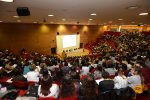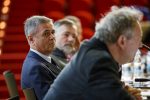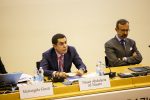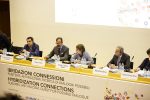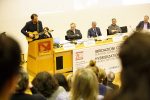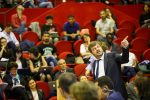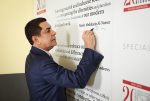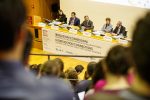5th Bicocca Intercultural Day
Bicocca University, Milan, Italy
23 May 2018 | 9:00 AM
REMARKS BY H.E. MR. NASSIR ABDULAZIZ AL-NASSER
HIGH REPRESENTATIVE
FOR THE UNITED NATIONS ALLIANCE OF CIVILIZATIONS
Prof. Messa, Rector of the University of Milano-Bicocca,
Prof. Riva, Director, Department of Human Sciences for Education,
Mr. Majorino, Councilor, Municipality of Milan,
Mr. McAndrews, Vice President , Communication Strategy, Corporate and Market Communications, BMW Group
Mr. Solero, President and CEO, BMW Group Italy
Prof. Giusti, University of Milano-Bicocca
Good morning,
I am very pleased to be back at this esteemed university and to participate for the third year since 2014 in the Bicocca Intercultural Day. I would like to start by thanking Bicocca University and Prof. Giusti for her ongoing commitment and for organizing this successful event for the 5th year. I also wish to pay a special thanks to BMW Group for their continuous support for this important initiative.
The main theme of today’s event, “Hybridization, Connections, Suburbs, Antiracism, a quest for possible dialogue” strongly aligns with the core of the United Nations Alliance of Civilizations’ mission which strives to promote intercultural dialogue, diversity and social cohesion with a view to preventing racism, xenophobia and related intolerance in our societies.
We live in an increasingly globalized world. This comes with great benefits: integrated economies, reduced transportation costs and barriers, greater opportunities for trade and knowledge transfer, and extraordinary technological progress.
But at the same time, in many ways, underlying tensions and grievances have resurfaced. Many countries are experiencing violent conflict; inequalities are increasing; we are witnessing a global migration, unlike anything we have seen in generations, and an alarming rise in the wave of intolerance, nationalism, violent extremism, and xenophobia.
Given this landscape, building inclusive societies is a key priority for the United Nations in general, and the Alliance in particular. Recognizing the multi-ethnic, multi-religious, multi-cultural component of our current world is imperative, as much as investing in social cohesion and education.
There can be no doubt that we can only address the complex challenges of today if our solutions are firmly anchored in research and evidence. We need continued investment in and engagement with the research community. We often talk about how we are living in a post truth era. In an environment marked by mistrust and misinformation, we need to ensure that evidence-driven research guides our collective efforts.
I am very pleased and energized to see so many young people in the audience. You all represent an extraordinary force of social progress, inspiring political change, and proposing innovative solutions to our most pressing challenges. Young women and men are important drivers and agents of change. Youth are often more open to feedback, learning and encouragement. They are often also more idealistic, creative and innovative.
We must therefore engage youth as critical messengers who can spread the word when it comes to issues of inclusion and diversity. We must recognize that instilling values in our youth is the one most lasting, most sustainable investment we, as a global community, can make.
Given the venue of this event and the audience, I would also like to stress the crucial role of education here.
Education can indeed represent a powerful weapon that we can use in promoting social cohesion, respect for diversity and fighting, ignorance, xenophobia and racism.
In our multicultural societies, one of the major challenges we face is to learn to live together, peacefully. Multicultural education should be complemented by intercultural education. Teaching individuals about cultural diversity is a matter of teaching values, approaches and attitudes. It is not just a matter providing content. In this sense, before tolerance and respect become a skill, they must be practiced. Aristotle, the Greek philosopher, once said “educating the mind without educating the heart is no education at all”. We should therefore look at education that does not only focuses on producing individuals who can read, write and count. But rather an education that also brings shared values to life and one that cultivates a sense of caring and belonging for all humanity.
Ladies and Gentlemen,
The role of the United Nations Alliance of Civilizations in promoting inclusive societies is very clear. We work toward a more peaceful, more socially inclusive world, by building mutual respect among peoples of different cultural and religious identities. Since 2013, we have provided a platform for highlighting the will of the world’s majority to reject violent extremism and intolerance while embracing diversity and peaceful coexistence.
Our ability to deliver on our goals, however, requires collaborating effectively with other important partners in our societies, such as academia and the corporate sector, all entities which can have a critical role in fostering understanding and respect for diversity.
The Intercultural Innovation Award, in partnerships with BMW Group, is an excellent example of such collaboration. Since 2011, UNAOC and BMW Group have joined forces to find innovative ways to bridge divides, build knowledge on cultural diversity, promote respect and peace across religions and develop intercultural partnerships. We do this by selecting and supporting grassroots organizations working on innovative projects promoting intercultural dialogue. Since 2011, we awarded 51 organizations coming from all over the world whose work is reaching more than 100 countries across all continents.
Let me take the opportunity to commend the leadership of BMW Group and thank Mr. McAndrews for his vision and constant support to this initiative.
I would like to conclude by saying that we all share a common aspiration of achieving peaceful, just, prosperous and inclusive societies. I trust that through our collective efforts we can build communities that are more inclusive as they recognize diversity as a source of strength and richness rather than a threat.
Thank you.

